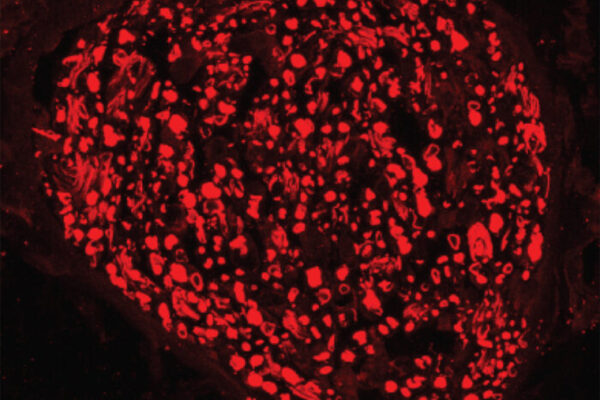Adding to a growing body of evidence that, for many, problems related to COVID-19 linger longer than the initial infection, researchers at Washington University School of Medicine in St. Louis have found that some people infected during the pandemic’s early months experienced symptoms of peripheral neuropathy — pain, tingling and numbness in the hands and feet — during and following their bouts with the virus.
In a study of more than 1,500 people who were tested for SARS-CoV-2 during the first year of the pandemic, the researchers found that those who tested positive for the virus were about three times more likely to report pain, numbness or tingling in their hands and feet as those with negative tests.
The findings are reported online March 24 in the journal Pain.
“Several viral infections — such as HIV and shingles — are associated with peripheral neuropathy because viruses can damage nerves,” said senior investigator Simon Haroutounian, chief of clinical research at the Washington University Pain Center. “We found that nearly 30% of patients who tested positive for COVID-19 also reported symptoms at the time of their diagnosis, and that for 6% to 7% of them, the symptoms persisted for at least two weeks, and up to three months, suggesting this virus may have lingering effects on peripheral nerves.”
Haroutounian, who also is an associate professor of anesthesiology and director of the department’s Division of Clinical and Translational Research, said some patients who traced the start of their neuropathy symptoms to a COVID-19 infection have sought treatment at the Washington University Pain Center. Most of those in the study, however, reported problems that were rated as mild to moderate and may not have sought help from a pain specialist.
“It is important to understand whether a viral infection is associated with an increased risk of neuropathy,” he said. “In the case of HIV, we didn’t realize it was causing neuropathy for several years after the AIDS epidemic began. Consequently, many people went undiagnosed with neuropathy and untreated for the pain associated with the problem.”
He said the same may be true now for patients with symptoms of neuropathy following COVID-19. There is no established diagnosis of neuropathy related to COVID-19, but Haroutounian explained that, regardless of the cause, current treatments for neuropathy are somewhat similar. Pain specialists use the same types of medications to treat peripheral neuropathy, whether it’s caused by diabetes or HIV or the cause is unclear.
“There is a high likelihood we could still help these patients, even though at the moment there are not clear diagnostic criteria or even a recognized syndrome known as COVID peripheral neuropathy,” he said.
The research team surveyed patients who were tested for COVID-19 on the Washington University Medical Campus from March 16, 2020, through Jan. 12, 2021. Of the 1,556 study participants, 542 had positive COVID-19 tests, and 1,014 tested negative.
Many of those who tested negative were tested because they were undergoing surgery or were already hospitalized with cancer, diabetes or other health problems, Haroutounian said. Because of those existing health problems, many who tested negative already experienced chronic pain and neuropathy unrelated to COVID-19, he said.
Study patients who tested positive tended to be healthier and younger, and 29% reported symptoms of neuropathy at the time of their diagnosis. That compared to neuropathy problems in about 13% of the participants who tended to have health challenges but tested negative for COVID-19. He said this finding strengthens the possibility that the virus may be involved in causing symptoms of peripheral neuropathy.
Because the study was conducted at a single center, Haroutounian said more research will be needed to replicate the findings. In addition, much of the data was gathered when outpatient clinical research had been halted due to the pandemic, meaning that study patients were evaluated according to their responses to a survey rather than via in-person interviews and physical exams.
“We also finished our data collection before vaccinations became widespread and before the delta or omicron variants arrived, and it’s difficult to say what effects those variables may have,” he said. “So we want to follow up with some of those patients who have lingering nerve symptoms and learn about what is causing their pain so that we can better diagnose and treat these patients moving forward.”
Odozor CU, Kannampallil T, Abdallah AB, Roles K, Burk C, Warner BC, Alaverdyan H, Clifford DB, Piccirillo JF, Haroutounian S. Post-acute sensory neurological sequelae in patients with SARS-CoV-2 infection: an observational cohort study. Pain, March 24, 2022.
This work is supported by the National Cancer Institute, and the National Center for Advancing Translational Sciences of the National Institutes of Health (NIH). Grant numbers UL1 TR000448 and P30 CA091842, an NCI Cancer Center Support Grant awarded to the Siteman Comprehensive Cancer Center.
Washington University School of Medicine’s 1,700 faculty physicians also are the medical staff of Barnes-Jewish and St. Louis Children’s hospitals. The School of Medicine is a leader in medical research, teaching and patient care, and currently is No. 4 in research funding from the National Institutes of Health (NIH). Through its affiliations with Barnes-Jewish and St. Louis Children’s hospitals, the School of Medicine is linked to BJC HealthCare.



